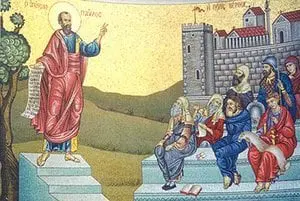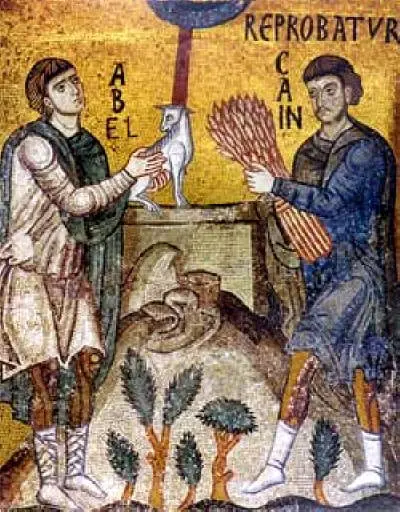(Part 1) - Author: Archbishop Sergius of Solnechnogorsk **
Dear participants in the international conference “Actions of Christians in Response to Natural Disasters and Emergencies”!
First of all, allow me to cordially congratulate you, those gathered to participate in the conference, and also to express my gratitude to the initiators of this meeting. With all my heart I wish you successful and fruitful work!
Before moving on to the main part of the report, I would like to make a few preliminary remarks.
Man and the world around him are closely connected and included in the God-man-nature triangle. Being a part of creation, man belongs to the material world by his physical nature and represents in itself the dust of the earth, in which God “breathed into them the breath of life” (Gen. 2: 7). Therefore, it would be unjustified to consider the problem of natural disasters and their consequences for man outside the connection with the evolution of the nature of the relationship between man and nature.
As one of the delusions of our time, we must recognize the determination of the hierarchy of values on the principle of benefit.
The whole life of people is accompanied by achieving certain goals, solving certain problems and tasks. Assistance to victims of emergencies and natural disasters, environmental protection and many other phenomena of social significance can be included in this type of targeted activity. We, as believers, realize that only the transformed cosmos, when the Lord “gave the kingdom to God and the Father that God may be all things to all men” (1 Cor. 15:24, 28), is the ultimate goal. to be subordinated to all other objectives, temporary objectives, the value of which is determined by the extent to which they correspond or do not correspond to the achievement of the ultimate goal.
This is important to clarify in order to bear in mind that attempts to overcome the crises in which human society is falling must be carried out in a system that presupposes the priority of absolute values. Such an approach will allow overcoming the temptation to orient oneself to private topical issues with obvious inattention to the basic issues of existence.
The very concepts of “natural disasters”, “emergencies”, “life” require a deeper theological understanding. What are the sources and causes of natural disasters? Why are emergencies increasingly taking place in people’s lives? What causes the participation of the religious leaders of the people of God in the work of helping the victims of natural disasters? In my report I try to answer the questions just formulated from the point of view of the Holy Scriptures and the church tradition.
The material reality of the world, existing in an incalculable variety of species and forms, is in itself the free creative energy of God, who created the world so that every creature can participate in the Divine truth and glory, so that all creation can become an expression. of the unity and love that make up the image of the Creator’s being.
God created the whole visible and invisible world beautifully, and there was nothing foreign to the Creator in it. According to the prominent theologian of the 19th century, Saint Filaret of Moscow, the first man “was introduced into the world as a bishop in a home, as a priest in a temple, perfectly arranged and decorated” (Notes on the Book of Genesis, V.1, Moscow, 1867, 1867). p. 20). Man’s attitude toward the environment of his habitation is defined in the language of the Bible as “possession” of the earth and “dominion” over it (Gen. 1:28). The centuries-old history of human communication with nature may lead us to believe that the first man was called to conquer, restrain and subdue the first created nature, which seems to be in a violent, wild and even hostile state.
But from the biblical narrative we learn that man is called to a caring, loving attitude of nature; that, according to the Divine destiny, the environment should acquire in man not a bystander who only admires and enjoys the beauties of the Earth, but not an accountant and a predator, but a good and caring master. In other words, one must cultivate and preserve this realm of beauty and harmony, of which he was the owner. As long as he acted in accordance with the Creator’s plan, no conflicts arose between him and nature. He did not disturb the biological balance in nature: the relationship “man-habitat” was alive, organic. Man, although exalted above nature, with all his being fit into the natural balance. Immeasurably exalted above the world through his creation in the image of God, a diminished angelic rank – “you humbled him a little against the angels” (Ps. 8: 6), man at the same time with his whole being is involved in cosmic matter and cosmic life. It is no coincidence that the holy fathers, following the ancient philosophers, call man “microcosm”. Thus man’s empathy for the world around him has a very deep meaning. Man, created by God, includes the whole of the created cosmos and, at the same time, enters into union with nature. From that moment on, his destiny and the destiny of nature became inseparable. Nature is entrusted to man, and man is given responsibility for his destiny. In this sense, man and nature constitute a single body, a single organism, a harmonious unity. In this sense, the earthly nature is a continuation of the corporeality of man, as we can call it, using the terminology of VN Loski, anthroposphere (Lossky VN Dogmatic theology. – In: Theological works, Issue 8, M., pp. 158).
Man for the universe is her trust in grace and union with God, but there is also the danger of defeat and destruction. Man is the greatest creation of God, endowed with freedom and the ability to love and, therefore, to refuse. Man, as a person, God endowed with freedom of choice between true being and non-being, between good and evil. This means that in the heavenly state the first people had the opportunity to sever the essential connection with God and to pass to an autonomous existence.
The sin that entered the world proved catastrophic not only for man but also for nature. Man’s unity with the world around him was broken. In nature, as in a mirror, the first human crime was reflected.
With the fall of man, who opposed himself to God and thus violated the original harmony and integrity of creation, evil enters the world, which has no ontological basis. It is not existential, it does not originate from being; it is a defect and an imperfection. It is in this sense that, contemplating the created nature, we perceive and realize both its good and its evil. This discrepancy between the ideal of the Creator’s timeless plan and the reality of the temporary life of creation contains the greatest drama, both for nature and for man.
In the new harsh living conditions, the sinner has no choice: involuntarily, as the Scriptures say, he has to “cultivate the earth with the sweat of his brow” in order to feed himself (Gen. 3:19). For decades, man has realized in labor that he lacks the strength to fully master all the benefits of nature. A sense of his own weakness inevitably arose in him. Nature hid many of its secrets from man and seldom allowed him access to the riches of the earth and the world’s oceans. At the same time, it often struck and even threatened man with its terrible and powerful catastrophic phenomena. All this led to the fact that people began to treat nature with a sense of fear, distrust and even aggression.
Dependence on nature and fear of it led man to the level of a slave to the elements. Under the rule of the cruel laws of the surrounding reality, primitive man began to deify nature and worship demons. This is how paganism came into being. People “worshiped and served creation more than the Creator” (Rom. 1:25). In order to protect himself from the actions of evil spirits, and in some way to influence the elements, ancient man resorted to magic, which was both a means of subjugating nature and a means of knowing the world around.
Thus, the consequence of the Fall was not only the damage of human nature, but also the disruption of man’s harmonious relationship with the outside world. The perversion of life leads to deformation and destruction of the normal (God-ordained) way of life. Life not in union with God, but independently of Him – this is life only for the sake of self-preservation for the sake of biological survival. In this case, man already exists as a natural individual, living at the expense of his own strength and energy, which is inherent in creatures. The desire to become like gods becomes a tragedy not only for humans, but for the whole created world.
Christianity not only freed man from the power of nature, but also exalted him. Christ appeared in the world so that people “may have life and have it abundantly” (John 10:10). Man was again given the opportunity to become “God’s co-worker” (1 Cor. 3: 9), the ruler of creatures, to take care of everything created by the Creator.
However, the proud placing of man at the center of the universe has led to a disruption of the harmony between nature and humans. Christ’s commandments were not the basis of modern technological progress: “Don’t worry about what you drink and what you wear.” The balance in the “man-nature” relationship was again disturbed, but in a different direction: towards the enslavement of the surrounding world.
The new age with its ideology of non-religious humanism was expressed in a new attitude towards nature, the essence of which is most vividly and clearly expressed in the widely known slogan: “We can not wait for mercy from nature, to take from it is our task.” .
It was in this time, anthropocentrically in its essence, that man’s life was darkened not only by natural disasters, but also by emergencies – various kinds of accidents, crashes and catastrophes.
The tragic consequences of the fall of our forefathers are expressed in the pedagogical language of the Old Testament Scriptures in the image of an angry God punishing crimes. The global flood and the plagues of Pharaoh, drought and earthquakes, fire and sulfur, destroyed
Sodom and Gomorrah, floods and epidemics – all these and many other natural disasters are considered by the church consciousness as God’s punishment (translated from Greek “natural disaster” literally means “wrath of God”), as evidenced by His wrath. But God is not a punishing judge. The only thing in which God’s intervention is noticed is in the transformation of the punishment, voluntarily imposed by the man on himself, in the saving pedagogical action.
No one will deny that natural phenomena do not always correspond to the design and desire of man, and are often the opposite of them. In the struggle against the natural forces of living space, man does not want to see that nature itself suffers from its violence. Man does not want to be a creator anymore, but absolutizes himself as a creator, but without God. This means that the crisis of all creation – of nature and man – is inevitable.
Authorized translation: Petar Gramatikov
Notes:
* Source: Sergius, Archbishop of Solnechnogorsk. Assistance to victims of natural disasters and emergencies is the duty of religious organizations: [Report at an international seminar on November 13-14, 1996 in Moscow. The seminar is organized by the Department of Social Service and Charity, WCC and the UN]. – In: Journal of the Moscow Patriarchate (JMP), Moscow, 1997, № 1, p. 50-55.
** According to a decree of the Holy Synod of the Russian Orthodox Church of December 25-26, 2013, the Voronezh Metropolitanate was formed within the Voronezh region, including the Voronezh, Borisoglebsk and Rososhan dioceses. The Most Reverend Metropolitan Sergius was appointed head of the Voronezh Metropolitanate with the title “Voronezh and Liskinsky”.







